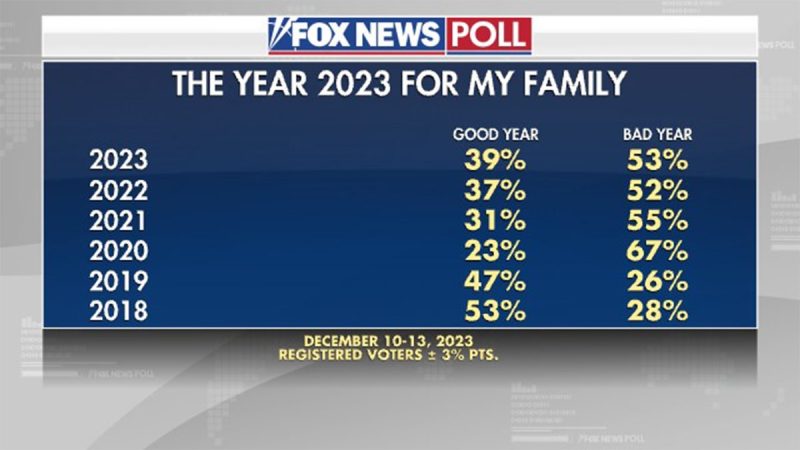Despite recession woes, foreign policy conflicts, and heated election campaigning, 4 in 10 voters feel 2023 was good for them personally and over 2 in 10 say the same for the country. While both numbers are up over 10 points since reaching record lows in 2020, majorities feel the year ending was another bad one.
The Fox News survey, released Friday, finds 39% of voters say 2023 was good for them and their family, while 53% say it was bad.
That’s about where it was at the end of 2022 (37% good vs. 52% bad). But it’s up significantly since record lows in 2020, a year that saw a global pandemic, lockdowns, and a contentious U.S. presidential election. At the time, a low of 23% of voters said it was a good year.
There is a similar positive trend when it comes to how voters feel the country overall fared this year. In 2020, only 13% said it was a good year for the country and 78% said bad, while today it’s 24% good, 66% bad – again, about where it was in 2022 (23%, 67%).
The biggest increases in positive outlook since 2020 — from both a personal and a national perspective — come from Black voters (+31 points personally, +31 points the country), voters ages 65 and older (+36 and +22) and Democrats (+35 and +27).
Independents are also up since 2020, but by smaller margins: +13 points saying it’s been a good year personally, and +11 for the country.
Republicans’ ‘good’ outlook has held relatively steady over the last 3 years, with about one quarter saying 2023 was a good year for them personally and 10% currently giving the country a positive outlook.
Between 2013 and 2018, over half of voters overall felt the years ending were good for them personally, reaching a high of 57% in 2014.
Voters have felt more negatively than positively about the country every year since the question was first asked in December 2018.
CLICK HERE FOR TOPLINE AND CROSSTABS
Conducted Dec. 10-13, 2023, under the joint direction of Beacon Research (D) and Shaw & Company Research (R), this Fox News Poll included interviews with 1,007 registered voters nationwide who were randomly selected from a voter file and spoke with live interviewers on both landlines and cellphones. The total sample has a margin of sampling error of plus or minus three percentage points.

